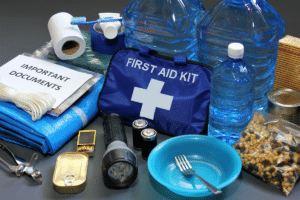March is Women's History Month, a time dedicated to recognizing and celebrating the vital role…
 A crisis, such as an unexpected illness or a natural disaster, may one day require you to act quickly and decisively. Thinking and adapting can be particularly difficult when you are facing a high-stress situation.
A crisis, such as an unexpected illness or a natural disaster, may one day require you to act quickly and decisively. Thinking and adapting can be particularly difficult when you are facing a high-stress situation.
This is why disaster experts emphasize the importance of planning for various types of emergencies. Especially for seniors and their caregivers, having a plan in place should an emergency strike can help provide peace of mind in a turbulent world.
Here are a few elements of crisis planning that you may not have thought of before.
Sharing Caregiving Information
What if a crisis makes it so you are unable to continue caring for a loved one? Are there other trusted individuals who will be able to step in and provide care? How familiar are those individuals with your loved ones needs? The more they know about how to tend to your loved one’s needs, the better.
Consider creating a document to share with alternate caregivers. List your loved one’s current needs, impairments, medications, and allergies. Describe what a typical day looks like for them, what provides comfort, and what foods they enjoy or avoid. Include crucial identifying information such as a current photo, date of birth, and Social Security number. It may be helpful to include a short biography informing providers of your loved one’s interests, personality, and background.
Emergency Information
Consider what information you may need to communicate in the event of a sudden crisis. Be sure to keep any relevant medical information and the contact information of trusted contacts in an accessible place.
Also take time to consider who can give information and act on your behalf in the event of a crisis that renders you temporarily incapacitated. Having advance directives such as a durable power of attorney and a health care proxy in place can help others help you.
Planning for Evacuation
If you needed to evacuate your home in the event of a natural disaster, how would you evacuate quickly and safely? Where would you go, how would you get there, and what you would need to bring?
Consider compiling a portable disaster supplies kit that you leave in an easily accessible area of your home or vehicle, which can be accessed and moved quickly. You may want to include items like N95 masks, matches, and towels can prove useful in an emergency, as well as relevant medical supplies and associated batteries or chargers.
Start Small – and Soon
Although it may feel overwhelming to consider all the things that may need to be done in the event of a crisis, planning for these situations can help reduce anxiety and keep you calm if an emergency occurs. Start with the basics today.
If you would like to speak with an experienced elder law attorney regarding your situation or have questions about something you have read, please do not hesitate to contact our office at 1 (800) 680-1717. We look forward to the opportunity to work with you.



